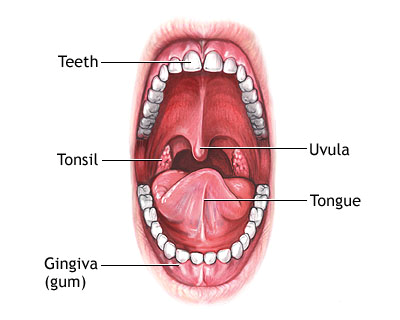Oral cancer
Content
Causes
Symptoms
Exams and Tests
Treatment
Support Groups
Outlook (Prognosis)
Possible Complications
When to Contact a Medical Professional
Prevention
Oral cancer is cancer that starts in the mouth.

Causes
Oral cancer most commonly involves the lips or the tongue. It may also occur on the:
· Cheek lining
· Floor of the mouth
· Gums (gingiva)
· Roof of the mouth (palate)
Most oral cancers are a type called squamous cell carcinoma. These cancers tend to spread quickly.
Smoking and other tobacco use are linked to most cases of oral cancer. Heavy alcohol use also increases the risk for oral cancer.
Other factors that may increase the risk for oral cancer include:
· Chronic rubbing (such as from rough teeth, dentures, or fillings)
· Human papillomavirus (HPV) infection (same virus that causes genital warts)
· Taking medicines that weaken the immune system (immunosuppressants)
· Poor dental and oral hygiene
Some oral cancers begin as a white plaque (leukoplakia) or as a mouth ulcer.
Men develop oral cancer twice as often as women do. It is more common in men older than 40.
Symptoms
Oral cancer can appear as a lump or ulcer in the mouth that may be:
· A deep, hard-edged crack in the tissue
· Pale, dark, or discolored
· On the tongue, lip, or other area of the mouth
· Painless at first, then a burning sensation or pain when the tumor is more advanced
Other symptoms may include:
· Chewing problems
· Mouth sores that may bleed
· Pain with swallowing
· Speech difficulties
· Swallowing difficulty
· Swollen lymph nodes in the neck
· Tongue problems
· Weight loss
Exams and Tests
Your doctor or dentist will examine your mouth area. The exam may show:
· A sore on the lip, tongue, or other area of the mouth
· An ulcer or bleeding
Tests used to confirm oral cancer include:
· Gum biopsy
· Tongue biopsy
X-rays and CT, MRI and PET scans may be done to determine if the cancer has spread.
Treatment
Surgery to remove the tumor is usually recommended if the tumor is small enough. Surgery may be used together with radiation therapy and chemotherapy for larger tumors.
Depending on what type of treatment you require, supportive treatments that may be needed include:
· Speech therapy
· Therapy to help with chewing, swallowing
· Learning to eat enough protein and calories to keep your weight up. Ask your doctor about liquid food supplements that can help
· Help with dry mouth
Support Groups
You can ease the stress of illness by joining a cancer support group. Sharing with others who have common experiences and problems can help you not feel alone.
Outlook (Prognosis)
Approximately half of people with oral cancer will live more than 5 years after they are diagnosed and treated. If the cancer is found early, before it has spread to other tissues, the cure rate is nearly 90%. More than half of oral cancers have spread when the cancer is detected. Most have spread to the throat or neck.
Possible Complications
Complications of oral cancer may include:
· Complications of radiation therapy, including dry mouth and difficulty swallowing
· Disfigurement of the face, head, and neck after surgery
· Other spread (metastasis) of the cancer
When to Contact a Medical Professional
Oral cancer may be discovered when the dentist does a routine cleaning and examination.
Call your health care provider if you have a sore in your mouth or lip or a lump in the neck that does not go away within 1 month. Early diagnosis and treatment of oral cancer greatly increases the chance of survival.
Prevention
Oral cancer may be prevented by:
· Avoiding smoking or other tobacco use
· Having dental problems corrected
· Limiting or avoiding alcohol use
· Visiting the dentist regularly and practicing good oral hygiene

